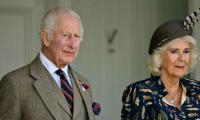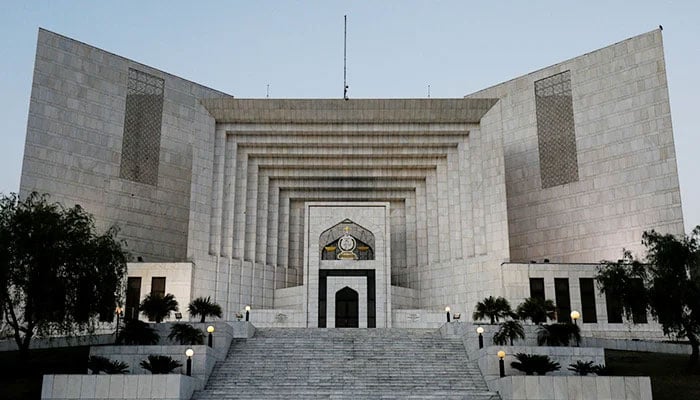Why court should hear case of a person who is out of parliament: SC
CJP Justice Umer Ata Bandial asked when the petitioner was not present during the legislation process, how could he challenge that process
ISLAMABAD: Chief Justice of Pakistan Justice Umer Ata Bandial on Tuesday asked when the petitioner was not present during the legislation process, how could he challenge that process. He also underlined that parliament should settle the NAB amendments issue quickly.
Also, Justice Mansoor Ali Shah told PTI’s counsel “neither Imran Khan wants to be a part of parliament nor accept its decisions, then why should the court decide the case of such a person who does not want to be a part of parliament.”
A three-member bench of the apex court, headed by Chief Justice Umer Ata Bandial and comprising Justice Ijazul Ahsen and Justice Syed Mansoor Ali Shah, heard the petition of former prime minister and Chairman Pakistan Tehreek-e-Insaf (PTI) Imran Khan, challenging the amendments made by the coalition government in the National Accountability Ordinance (NAO) 1999.
Continuing his arguments, Makhdom Ali Khan, counsel for the federal government, submitted that the anti-graft body (NAB) was used in the past for political engineering. “It is important to examine as to whether the amendments made in NAB law are unconstitutional or not,” the counsel submitted adding that a senator returned to Pakistan and took oath as a minister and after appearing before the court, cases against him were withdrawn.
“Even the leaders of Pakistan Tehreek-e-Insaf benefited from NAB amendments but nobody challenged it in the court. That shows how NAB had been used for political engineering,” the counsel submitted.
The federal government’s counsel contended that the former prime minister and former finance minister filed a NAB case against the chief executive of an institution, who was acquitted by the court when no case was established against him and after he remained in jail for several years.
Chief Justice Umer Ata Bandial, however, asked the learned counsel to file a case over the conduct of NAB and the court would take action. The Chief Justice said that they wanted to improve the legal system of the country, damaged by incompetent investigation officers and prosecutors. “We want independent investigation officers and prosecutors,” the CJP remarked.
During the hearing, the return of PTI to parliament also came under discussion when the Chief Justice observed that news had appeared in newspapers that PTI was going back to parliament. If the PTI returns to parliament, then whether the government will coordinate with it? Ask your client whether we should send back the matter to parliament?” the CJP asked the counsel for the federal government.
Makhdom Ali Khan, however, submitted that he cannot say anything without instructions from the government adding that the whole procedure is mentioned in the parliamentary system. “If PTI wants, it could present the NAB amendment bill in the parliament,” the counsel submitted.
Justice Ijazul Ahsen, another member of the bench, observed that instead of a majority, legislation should be made with consensus adding that national interest should be made supreme on the matter of NAB amendments.
“It is hoped that both the government and PTI will make legislation with consensus,” the judge remarked.
Makhdom Ali Khan submitted that there was no concept of democracy without politics adding that the concept of a national government was in existence since the Second World War. It is likely that after returning to parliament, the PTI may take the stance that the NAB amendments made during its government were correct,” Makhdom Ali Khan submitted.
“But we want that the matter under challenge should conclude at the earliest,” the CJP remarked adding that the court had repeatedly given observations that the NAB amendment’s matter should be resolved in the parliament.
Justice Syed Mansoor Ali Shah, another member of the bench, asked as to why the court should hear the case of such a person who was out of the parliament. “Neither Imran Khan wants to be a part of parliament nor accept its decisions, then why should the court decide the case of such a person who does not want to be part of parliament,” Justice Mansoor Ali Shah asked the counsel for PTI.
The judge further asked whether it would not be appropriate that PTI should move the NAB amendments bill to the parliament. “After debating it on the floor of the parliament, some good things may come forward,” the judge remarked.
The Chief Justice questioned when the petitioner was not present during the legislation process, how could he challenge that process adding that solid facts are pouring in day by day that cases are being withdrawn after the amendments in NAB law. So far, some 386 cases have been withdrawn, the CJP remarked.
Khwaja Haris, however, replied that the return to parliament or not is a political decision. Justice Mansoor Ali Shah, however, asked the learned counsel if parliament did not resolve the issue, then Imran Khan could approach the court. Justice Mansoor Ali Shah asked the learned counsel for the government whether cases that were sent back could be taken up in other forums.
Makhdom Ali Khan replied it could be taken up at other forums. The counsel at one point told the court that the amount paid back through a voluntary return to NAB was not yet deposited in the national exchequer. At this, Justice Ijazul Ahsen observed that the disappearance of the said amount was the real issue. Later, the court adjourned the hearing for today (Wednesday).
-
 Brooklyn Beckham's Wedding Dance With Mom Victoria Sparks Hilarious Memes
Brooklyn Beckham's Wedding Dance With Mom Victoria Sparks Hilarious Memes -
 King Charles' Latest Photos A Statement On His Health?
King Charles' Latest Photos A Statement On His Health? -
 Tom Cruise's Biggest Dream Crushed By The President?
Tom Cruise's Biggest Dream Crushed By The President? -
 King Charles, Queen Camilla Send Message To King Of Spain After Train Crash
King Charles, Queen Camilla Send Message To King Of Spain After Train Crash -
 'We Believe Brooklyn': David Beckham Trolled After Son's Statement
'We Believe Brooklyn': David Beckham Trolled After Son's Statement -
 Microsoft CEO Says AI Must Deliver Real World Impact To Survive
Microsoft CEO Says AI Must Deliver Real World Impact To Survive -
 Stranger Knocks, Then Opens Fire On Indiana Judge And Wife
Stranger Knocks, Then Opens Fire On Indiana Judge And Wife -
 Priscilla Presley's Derogatory Remarks On Late Daughter Lisa Marie Reignite Controversy
Priscilla Presley's Derogatory Remarks On Late Daughter Lisa Marie Reignite Controversy -
 Japan Unveils Anti-ship Missile With ‘barrel-roll’ Evasion To Outsmart Defenses
Japan Unveils Anti-ship Missile With ‘barrel-roll’ Evasion To Outsmart Defenses -
 How Brooklyn Beckham 'mentor' Prince Harry Inspiring Him To Speak Against Family?
How Brooklyn Beckham 'mentor' Prince Harry Inspiring Him To Speak Against Family? -
 Zac Efron, Kenny Ortega Revisit 'High School Musical' After 2 Decades
Zac Efron, Kenny Ortega Revisit 'High School Musical' After 2 Decades -
 Threads Overtakes X On Mobile Users: Here’s Why Everyone’s Switching
Threads Overtakes X On Mobile Users: Here’s Why Everyone’s Switching -
 Kanye West Eyes Performing First-ever Concert In India
Kanye West Eyes Performing First-ever Concert In India -
 Brooklyn Beckham's Claim About Nicola's Wedding Ordeal Gets Challenged
Brooklyn Beckham's Claim About Nicola's Wedding Ordeal Gets Challenged -
 AI Horror: 4 In 5 Young Workers Fear 'AI Could Replace Their Jobs', Says Report
AI Horror: 4 In 5 Young Workers Fear 'AI Could Replace Their Jobs', Says Report -
 Missouri Couple ‘locked Sons In Chicken Pen, Shot Them’ In Shocking Abuse Case
Missouri Couple ‘locked Sons In Chicken Pen, Shot Them’ In Shocking Abuse Case




